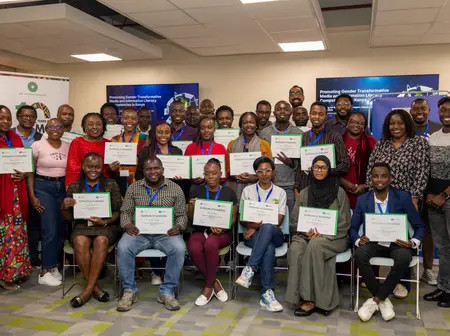United Nations Educational, Scientific and Cultural Organization(UNESCO) in partnership with the Aga Khan University (AKU) Graduate School of Media and Communications (GSMC), have successfully concluded a two-day training programme for editors, media managers, regulators, and representatives from journalists’ associations across the country.
The training is designed to strengthen the capacity of Kenyan newsroom leaders to combat misinformation and disinformation.
The programme, titled “Promoting Gender-transformative Media and Information Literacy Competencies in Kenyan Newsrooms,” was delivered under UNESCO’s Social Media 4 Peace (SM4P) initiative.
Participants were equipped with practical skills in fact-checking, verification, and integrating gender-transformative media and information literacy (MIL) policies into newsroom practices in Kenyan media.
The training emphasized how editorial leaders, who shape newsroom culture, standards, and policies, can embed inclusive approaches to strengthen ethical reporting, build public trust, and counter harmful online content.
Speaking at the close of the training, Professor Nancy Booker, Dean of GSMC, praised the collaboration and highlighted its importance for the Kenyan media landscape.
“This partnership with UNESCO and GSMC couldn’t be more timely. By focusing on editors and media leaders, we are empowering those who set the tone for journalism in Kenya, and by making sure we have representation beyond Nairobi we are practicing inclusivity. The lessons from this training will help transform newsrooms into spaces that not only resist misinformation but also champion gender-inclusive and evidence-based storytelling. We are proud to be part of this effort to safeguard truth and strengthen civic trust,” She said.
John Okande, Programme Coordinator at UNESCO, stated, the training is a crucial step in empowering Kenya’s media leaders to promote information integrity and effectively counter misinformation and disinformation.
“By equipping editors and media managers with practical skills to promote gendered Media and Information Literacy competencies, we are strengthening the foundational principles for ethical journalism in Kenyan newsrooms, ensuring they can build public trust and serve as reliable source of information for all,” He said.
The collaboration marked the beginning of a broader effort to equip African media with the tools needed to confront information disorder and uphold democratic values. UNESCO and GSMC call on news organizations, regulators, and civil society to join in scaling up these interventions and embedding media and information literacy (MIL) at the heart of their editorial policy and journalism practice across the region.
The Social Media 4 Peace project, currently in phase II, is a UNESCO EU-funded initiative which seeks to strengthen the resilience of societies to potentially harmful content spread online – in particular dis/misinformation and hate speech inciting violence – while protecting freedom of expression and enhancing the promotion of peace through digital technologies, notably social media.

Leave a Reply